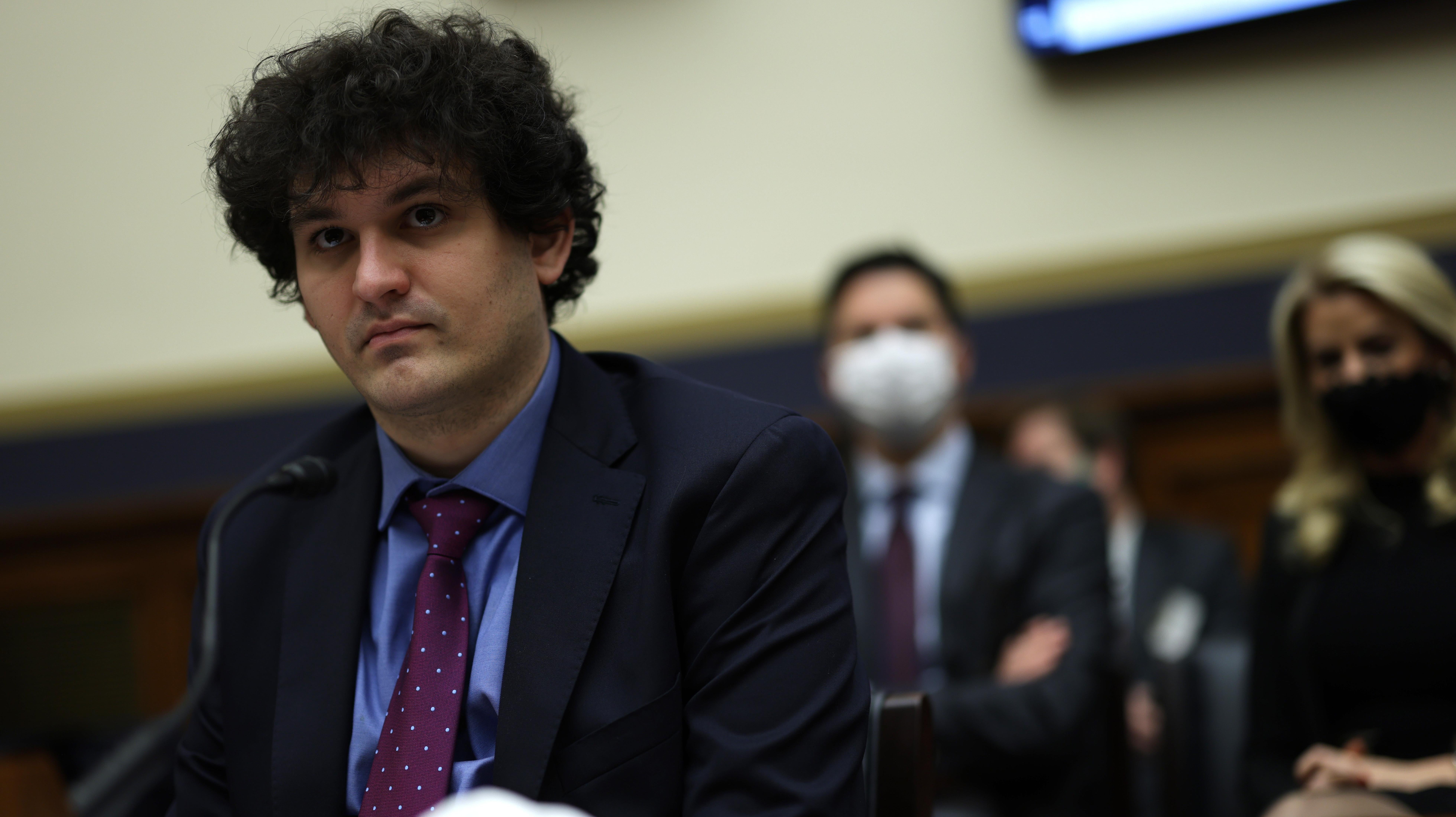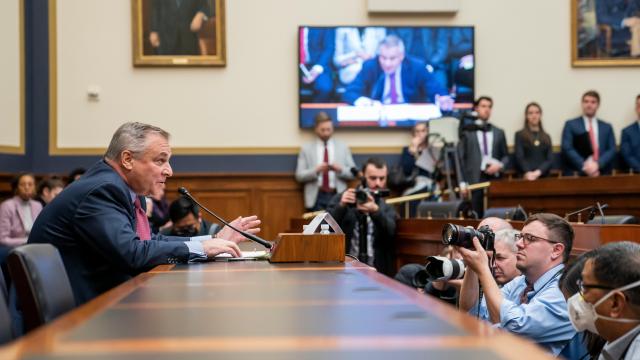The House Financial Services Committee began one of its most dramatic hearings in recent memory Tuesday, while its main subject, disgraced crypto exchange founder Sam Bankman-Fried, sat behind bars in a cell nearly 1,609 km away.
Instead, lawmakers questioned court-appointed FTX CEO John Ray III who said he had never seen, “such an utter failure of corporate controls at every level of an organisation.” That’s noteworthy, considering it’s coming from an executive who formerly oversaw the bankruptcy proceedings for the notorious 2001 Enron meltdown. Simply put, in terms of corporate disasters, FTX will go down in the history books.
Bankman-Fried, known by his initials SBF, was arrested on Monday in the Bahamas and now faces a host of legal charges, both civil and criminal from the Securities and Exchange Commission, U.S. prosecutors from the Southern District of New York, and the Commodity Futures Trading Commission over his role in facilitating the stunning collapse of what was once the world’s premier crypto trading platform.
Ray blamed the sudden fall of FTX last month on the absolute concentration of control by a small group of, “grossly inexperienced and unsophisticated individuals” headed by SBF. That cabal of crypto amateurs failed to implement, “virtually any of the systems or controls,” necessary for a company entrusted with people’s money.
The new CEO went on to say SBF engaged in a $US5 ($7) billion “spending binge” in late 2021 in addition to using FTX client funds to engage in margin trading with his hedge fund Alameda Research. Additionally, senior management at FTX allegedly had access to systems that stored customer assets without proper controls preventing them from redirecting those assets.
“This isn’t sophisticated whatsoever, “Ray said. “This is just plain old-fashioned embezzlement.”
It’s clear, Ray said during the hearing, that customer assets from FTX.com were commingled or mixed with assets from Alameda. Funds from FTX.com, which was the exchange for non-U.S. citizens, were then allegedly used at Alameda to make investments and other disbursements even though the entities were supposed to be separate. In reality, though, that separation was virtually nonexistent.
“It [FTX and Alameda] was really operated as one company,” Ray said during the hearing. “As a result there is no distinction between the companies.”
Ray, who’s overseeing FTX’s Chapter 11 bankruptcy proceedings and attempting to reunite investors with potentially billions in lost funds described disastrous levels of disorganization and distress at the company. The new CEO said record keeping at FTX was “virtually nonexistent,” leading him to inherit what he described as a “paperless bankruptcy.” Despite achieving a peak valuation of $US32 ($44) billion, Ray said FTX employees were still handling invoicing over Slack and accounting software program Quickbooks. That “unprecedented” lack of documentation makes tracing and returning lost customer assets all the more difficult. “The company is virtually void of any internal controls or documentations,” Ray said.
SBF: ‘I fucked up’

The hearing crucially occurred without the testimony of one key character: SBF himself. The disgraced crypto mogul was dramatically arrested in his apartment complex in the Bahamas on Monday evening less than 24 hours before he was set to speak at the hearing. In a statement immediately following his arrest, the government of the Bahamas said SBF’s arrest followed, “receipt of formal notification from the United States that it has filed criminal charges,” and was likely to request extradition. The arrest came just days after SBF publicly agreed to testify before the House Financial Services Committee, though SBF later told reporters he would only do so remotely because he was “quite overbooked.”
Though SBF was behind bars during the hearing, Forbes claims it obtained a draft copy of his prepared testimony, which can be read here. SBF began that testimony by, “formally stating, under oath: I fucked up.”
That apology tour, however, was short lived and quickly replaced by excuses and personal attacks. The founder said he felt pressured by FTX.US general council to file for Chapter 11 bankruptcy, alleging they, “called many of my friends, coworkers, and family members, pressuring them to pressure me to file.” SBF then went on to target Ray, who he said had not responded to his communications. SBF accused Ray and the law firms involved in overseeing FTX’s bankruptcy case of using the situation to rake in large legal fees. Elsewhere in his testimony draft, SBF accused Ray and his team of allegedly providing misleading information about FTX.U.S including about its insolvency. SBF, whose net worth hovered at over $US20 ($28) billion last year, said his bank account currently holds less than $US100,000 ($138,820).
Lawmakers, on the other hand, used the hearing to voice their frustration and opposition to the crypto industry, some more thoughtfully than others. Multiple lawmakers admitted they simply “didn’t get” crypto with others saying it seemed like an asset solely designed for criminality. California Representative Brad Sherman, who’s previously called on lawmakers to ban cryptocurrencies, said the recent demise of FTX proved, “crypto is a garden of snakes.” Committee Chairwoman Maxine Waters, meanwhile, expressed frustration at the timing of SBF’s arrest and said his absence at the hearing, “Denies the public the opportunity to get the answers they deserve.”
Bankman-Fried Built a ‘House of Cards’
The SEC filed a civil complaint against SBF early Tuesday morning accusing him of, “orchestrating a scheme to defraud equity investors in FTX.” The complaint accused the founder of engaging in years worth of frauds which saw him divert billions in FTX customer funds for his own benefit. From the very beginning, SBF allegedly funneled assets from FTX to Alameda before using those funds to make venture investments, purchase real estate, and make large political donations.
“We allege that Sam Bankman-Fried built a house of cards on a foundation of deception while telling investors that it was one of the safest buildings in crypto,” SEC Chair Gary Gensler said. “The alleged fraud committed by Mr. Bankman-Fried is a clarion call to crypto platforms that they need to come into compliance with our laws.”
Hours after the SEC filed its charges, an additional unsealed U.S. indictment charged SBF with eight criminal counts, including conspiracy, wire fraud, money laundering and campaign finance violation related to his massive political contributions . The Commodity Futures Trading Commission also unveiled its own charges against SBF, alleging he violated the Commodities Exchange Act.
On the political donations front, SBF reportedly donated an eye-popping $US37 ($51) million to Democratic and progressive political candidates in 2022 and suggested he would spend close to $US1 ($1) billion in the 2024 election cycle. Around $US300,000 ($416,460) of those donations reportedly found itself way in the pockets of nine members of the House Financial Services Committee involved in the hearing Tuesday. While most of SBF’s traceable political donations went towards one party, the founder recently told journalist Tiffany Fong he also donated to GOP causes through backchannels.
“All my Republican donations were dark,” SBF said during the interview late last month.
